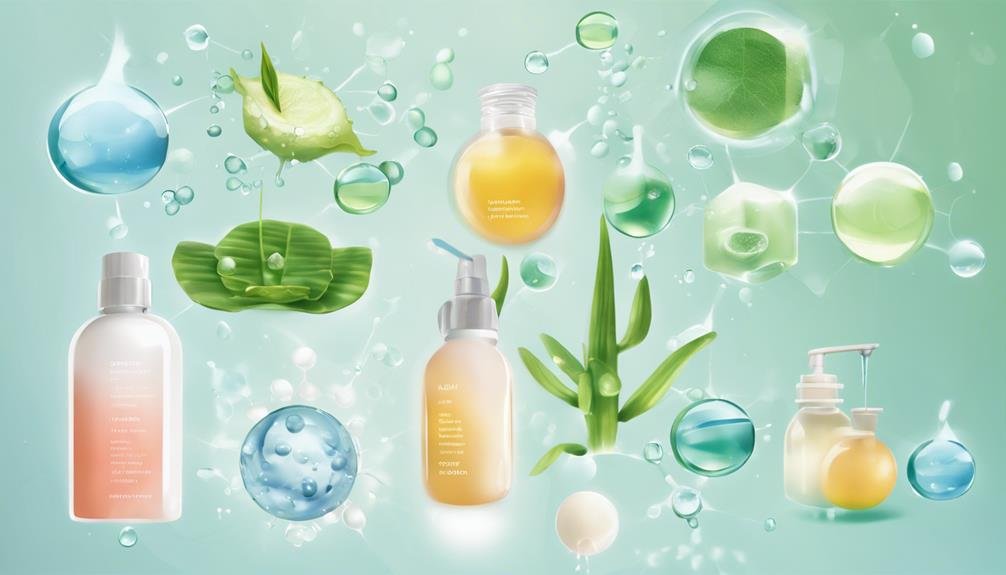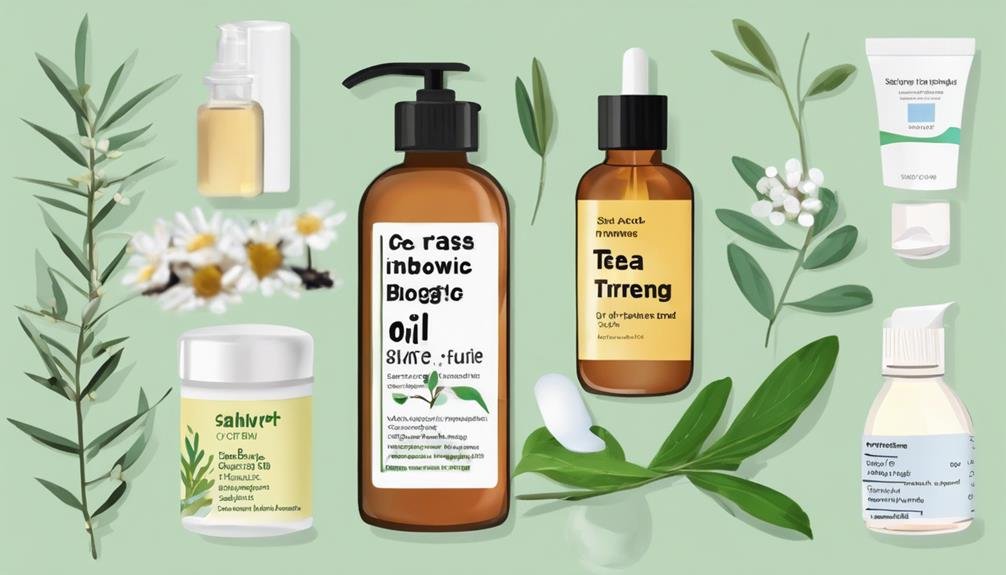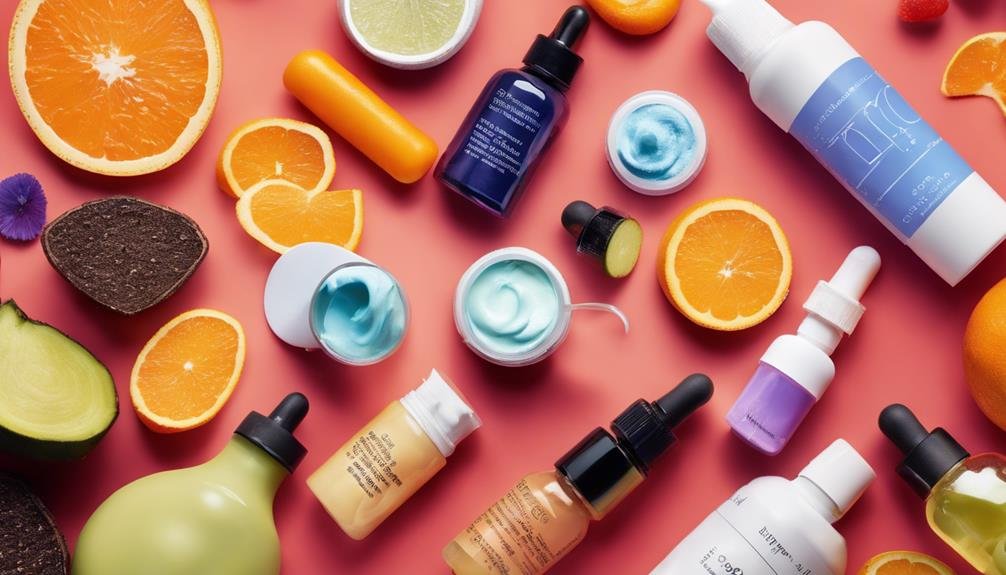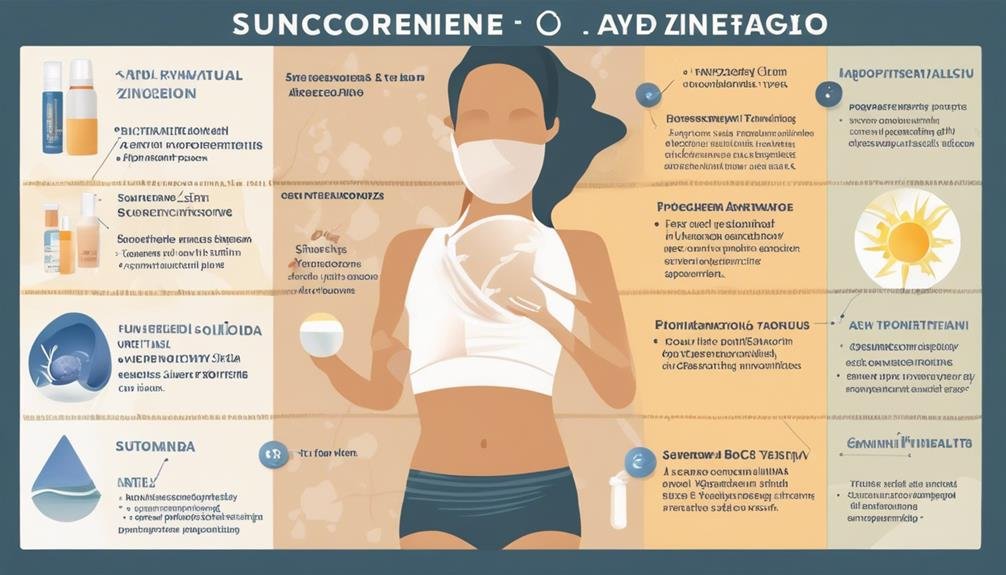When you reach for that bottle of moisturizer or serum, do you ever wonder what those ingredients listed on the back really do for your skin? Understanding the components in your skincare products can be like unraveling a mystery that holds the key to healthier skin. By decoding the language of ingredients, you can navigate the vast world of skincare with confidence and make informed choices that cater to your skin's unique needs. Curious to discover how some simple ingredients can transform your skincare routine into a personalized regimen for radiant skin?
Key Takeaways
- Focus on active ingredients like hyaluronic acid and retinol for specific skincare benefits.
- Check for potential allergens or irritants such as fragrances in skincare products.
- Understand the order of ingredients on labels to assess their concentration.
- Look for top-listed ingredients for higher concentrations in skincare products.
- Educate yourself on common hydrating, anti-aging, acne-fighting, and exfoliating ingredients for effective skincare.
Importance of Skincare Ingredients
When it comes to skincare, the ingredients you choose are crucial for achieving healthy and radiant skin. The products you apply on your skin can have a significant impact on its overall health and appearance. Ingredients like hyaluronic acid, vitamin C, retinol, and niacinamide are known for their beneficial effects on the skin.
Hyaluronic acid helps to hydrate and plump the skin, reducing the appearance of fine lines and wrinkles. Vitamin C is a powerful antioxidant that brightens the skin and protects it from environmental damage. Retinol is effective in promoting cell turnover and reducing the signs of aging. Niacinamide helps to strengthen the skin barrier and improve the skin's texture.
Choosing products with high-quality ingredients tailored to your skin type and concerns can make a noticeable difference in how your skin looks and feels. By understanding the role of different ingredients in skincare products, you can make informed decisions about what'll work best for your skin. Prioritize ingredients that are backed by scientific research and have proven benefits for the skin to achieve optimal results.
Reading Skincare Labels
Understanding how to read skincare labels is essential for making informed decisions about the products you use on your skin. When deciphering these labels, focus on the top ingredients listed as they're present in higher concentrations. Look for active ingredients like retinol, hyaluronic acid, or vitamin C, which are known for their specific skincare benefits.
Keep an eye out for potential allergens or irritants if you have sensitive skin, such as fragrances or certain preservatives. Understanding the order of ingredients can also help you identify if a product contains a significant amount of beneficial compounds or if they're only present in trace amounts.
Additionally, familiarize yourself with common terms like "hypoallergenic" or "non-comedogenic" to better understand how a product might interact with your skin. By reading skincare labels carefully, you empower yourself to choose products that align with your skincare goals and needs.
Common Hydrating Ingredients
Exploring the realm of skincare products, it's crucial to familiarize yourself with common hydrating ingredients that can provide much-needed moisture to your skin.
Hyaluronic acid is a popular hydrating ingredient known for its ability to hold up to 1000 times its weight in water, making it incredibly effective in boosting skin hydration.
Glycerin is another common ingredient that helps attract moisture to the skin, keeping it supple and hydrated.
Look for skincare products containing ceramides, which are lipid molecules that help strengthen the skin's barrier and prevent moisture loss.
Additionally, ingredients like squalane, derived from olives, and panthenol, a form of vitamin B5, are excellent hydrators that can nourish and soften the skin.
These hydrating ingredients work synergistically to maintain skin hydration levels, leaving your skin looking plump and healthy.
When choosing skincare products, keep an eye out for these hydrating ingredients to give your skin the moisture it craves.
Anti-Aging Powerhouses
Unveil the potent arsenal of anti-aging powerhouses that can revolutionize your skincare routine. As you strive to maintain youthful and vibrant skin, incorporating these key ingredients can help combat the signs of aging effectively:
- Retinoids: Known for their ability to boost collagen production and increase cell turnover, retinoids are a powerhouse ingredient in anti-aging skincare.
- Vitamin C: A potent antioxidant that helps brighten the skin, even out tone, and protect against environmental damage, Vitamin C is a must-have for anti-aging benefits.
- Hyaluronic Acid: This hydrating ingredient plumps the skin, reduces the appearance of fine lines and wrinkles, and enhances overall skin texture for a more youthful look.
- Peptides: These amino acid compounds help stimulate collagen production, improve skin firmness, and minimize the look of wrinkles, making them essential in anti-aging formulations.
Acne-Fighting Ingredients
To combat acne effectively, it's imperative to incorporate skincare products with targeted ingredients that address blemishes and promote clearer skin. Look for products containing salicylic acid, a beta hydroxy acid that penetrates deep into pores, exfoliating them from within and reducing acne-causing bacteria.
Another key ingredient to watch for is benzoyl peroxide, which effectively kills bacteria on the skin's surface and within pores, helping to clear up existing breakouts and prevent new ones from forming.
Additionally, retinoids like retinol can help unclog pores, reduce inflammation, and promote skin cell turnover, aiding in the prevention of acne.
Niacinamide, a form of vitamin B3, is also beneficial for acne-prone skin as it helps to regulate oil production and reduce redness and inflammation.
When selecting skincare products for acne, opt for those containing a combination of these potent ingredients to effectively combat blemishes and achieve clearer, healthier skin.
Soothing and Calming Agents
When seeking skincare products that offer relief for sensitive or irritated skin, prioritizing those formulated with soothing and calming agents is crucial. These ingredients work to reduce redness, inflammation, and discomfort, promoting a more balanced and comfortable complexion.
Look for products containing:
- Chamomile: Known for its anti-inflammatory and antioxidant properties, chamomile can help calm and soothe sensitive skin.
- Aloe Vera: Aloe vera is a natural ingredient that's hydrating and soothing, making it ideal for calming irritated skin.
- Green Tea Extract: Rich in antioxidants, green tea extract can help reduce redness and protect the skin from environmental stressors.
- Oat Extract: Oat extract has anti-inflammatory properties that can help soothe and comfort sensitive skin, making it a great ingredient for calming irritated skin.
Brightening and Lightening Compounds
When considering skincare products aimed at improving skin tone and addressing hyperpigmentation, incorporating brightening and lightening compounds can be beneficial. These compounds work by inhibiting melanin production, reducing the appearance of dark spots, and promoting a more even complexion. Ingredients such as vitamin C, niacinamide, kojic acid, and licorice root extract are commonly found in products designed for brightening and lightening the skin.
Vitamin C is a powerful antioxidant that not only brightens the skin but also helps in collagen production, improving skin texture. Niacinamide, a form of vitamin B3, is known for its ability to fade discoloration and strengthen the skin's barrier. Kojic acid, derived from fungi, inhibits melanin production, leading to a more even skin tone. Licorice root extract contains compounds that help fade dark spots and soothe the skin.
When seeking products with brightening and lightening compounds, look for those with clinically proven ingredients and consider incorporating them into your skincare routine for a more radiant complexion.
Exfoliating Ingredients Demystified
Exploring exfoliating ingredients can shed light on effective ways to improve skin texture and promote a radiant complexion. When delving into exfoliation, it's essential to understand the different ingredients that can help reveal smoother, healthier skin. Here are some key exfoliating ingredients demystified:
- Salicylic Acid: Ideal for oily and acne-prone skin, this beta hydroxy acid penetrates pores to remove excess oil and dead skin cells.
- Glycolic Acid: A type of alpha hydroxy acid, glycolic acid is excellent for gently exfoliating the skin, promoting cell turnover, and reducing the appearance of fine lines and wrinkles.
- Lactic Acid: Known for its hydrating properties, lactic acid exfoliates while keeping the skin moisturized, making it suitable for sensitive skin types.
- Enzymes: Natural enzymes like papain (from papaya) and bromelain (from pineapple) offer a gentler exfoliation option, ideal for sensitive skin or those looking for a more natural approach.
Understanding these exfoliating ingredients can help you choose the right products to achieve smoother, brighter skin.
Antioxidants for Skin Health
To enhance your skincare routine and boost skin health, incorporating antioxidants is a beneficial strategy. Antioxidants help protect your skin from damage caused by free radicals, which are unstable molecules that contribute to aging and skin diseases. They work by neutralizing these free radicals, preventing them from causing harm to your skin cells. Incorporating antioxidant-rich products into your skincare regimen can help improve the overall appearance and health of your skin.
| Antioxidant | Source | Benefits |
|---|---|---|
| Vitamin C | Citrus fruits, peppers | Brightens skin, boosts collagen |
| Vitamin E | Nuts, seeds, spinach | Moisturizes, protects from UV damage |
| Green Tea Extract | Green tea leaves | Soothes skin, reduces inflammation |
| Resveratrol | Berries, grapes | Anti-aging, improves skin elasticity |
Consider incorporating products containing these antioxidants into your routine to reap the benefits they offer for your skin health and appearance.
Essential Vitamins in Skincare
Incorporating essential vitamins into your skincare routine is crucial for maintaining healthy and radiant skin. These vitamins play a vital role in nourishing and protecting your skin from various environmental stressors.
Here are some essential vitamins to look for in your skincare products:
- Vitamin C: Known for its brightening and antioxidant properties, Vitamin C helps in reducing hyperpigmentation and promoting collagen production.
- Vitamin E: A powerful antioxidant that helps in protecting the skin from free radicals and UV damage, Vitamin E also aids in moisturizing and soothing the skin.
- Vitamin A (Retinol): Renowned for its anti-aging benefits, Vitamin A helps in reducing fine lines, wrinkles, and promoting cell turnover for smoother skin.
- Vitamin B3 (Niacinamide): Effective in improving skin texture, reducing redness, and controlling oil production, Vitamin B3 is a versatile vitamin for various skin concerns.
Understanding Sunscreen Components
Understanding the components of sunscreen is essential for effectively protecting your skin from harmful UV rays. Sunscreens contain various active ingredients that work together to shield your skin from the damaging effects of the sun. Below is a breakdown of common sunscreen components and their functions:
| Component | Function |
|---|---|
| Zinc Oxide | Provides broad-spectrum protection against UVA and UVB rays. It is gentle on the skin and suitable for sensitive skin types. |
| Titanium Dioxide | Acts as a physical barrier to reflect and scatter UV radiation away from the skin. It is also well-tolerated by most skin types. |
| Avobenzone | Absorbs UVA rays to prevent them from penetrating the skin and causing damage. It is often combined with other filters for enhanced protection. |
These components work synergistically to ensure your skin is shielded from the sun's harmful rays. When choosing a sunscreen, look for broad-spectrum protection and consider your skin type to select the most suitable option for your needs.
Fragrance and Allergens Awareness
Exploring the realm of skincare extends beyond sun protection to encompass factors like fragrance and allergens that can significantly impact your skin's health. Fragrances are added to skincare products to enhance the user experience, but they can also be a common source of skin irritation and allergic reactions. It's essential to be aware of potential allergens in skincare products to avoid adverse reactions and maintain skin health.
- Fragrances in skincare products can cause skin irritation, redness, and itching.
- Allergens like certain essential oils or preservatives may trigger allergic reactions in sensitive individuals.
- Fragrance-free products are a safer option for those with sensitive skin or allergies.
Patch testing new skincare products on a small area of skin can help identify potential allergens before full application.
Being mindful of fragrance and allergens in skincare products is crucial for maintaining healthy skin and preventing irritation. Opting for fragrance-free options and conducting patch tests can help you avoid unnecessary skin reactions and keep your skincare routine gentle and effective.
Frequently Asked Questions
How Do I Know if a Skincare Ingredient Will Suit My Skin Type?
To know if a skincare ingredient suits your skin type, conduct a patch test. Apply a small amount to your inner arm and wait 24 hours. If no irritation occurs, it's likely safe to use on your face.
Can I Mix Different Skincare Ingredients Together for Better Results?
Absolutely! Mixing different skincare ingredients can create a powerhouse cocktail for your skin. However, proceed with caution. Always patch test new combinations and introduce one ingredient at a time to ensure compatibility and avoid irritation.
Are Natural Ingredients Always Better for My Skin Than Synthetic Ones?
Natural ingredients are not always better for your skin than synthetic ones. The effectiveness of a skincare ingredient depends on its specific properties and how well it suits your skin type. Focus on finding what works best for you.
What Is the Shelf Life of Skincare Products With Active Ingredients?
The shelf life of skincare products with active ingredients varies based on formulation and packaging. On average, products can last 6-12 months once opened. To ensure efficacy, store in a cool, dark place and check for any changes in color or smell.
Can Skincare Ingredients Interact With Medications or Other Products I Use?
Skincare ingredients can interact with medications or other products you use. Always check for potential conflicts to avoid adverse reactions. Consult with a healthcare provider or a skincare professional for guidance to ensure safety and efficacy.
Conclusion
In conclusion, understanding the ingredients in skincare is key to achieving healthy, glowing skin. By reading labels, identifying key ingredients, and knowing which components work best for your skin type, you can tailor your skincare routine to meet your specific needs. Remember, knowledge is power when it comes to skincare – so arm yourself with information and watch your skin bloom like a well-tended garden.







